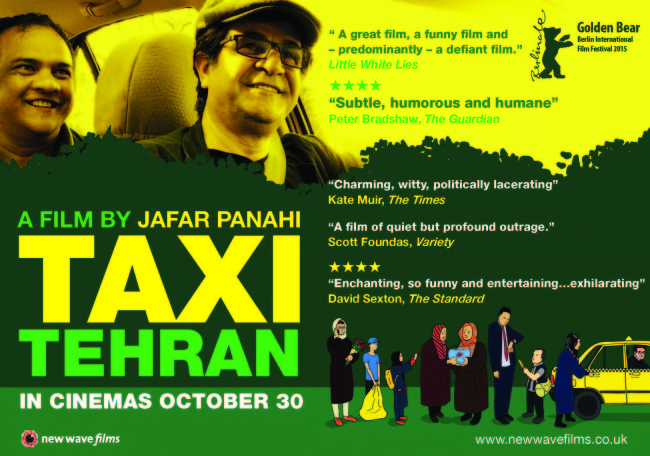Many thanks to our friend William Bruno from Brazil who submitted the following review of Jafar Panahi’s new film ‘Taxi’.
With the best first sequence I’ve seen since Kiarostami’s “Like Someone in Love” (2012), Jafar Panahi’s newest film ‘Taxi’ is a love letter to filmmaking. Five years into his twenty year ban on making movies in his native country of Iran, Jafar Panahi’s latest film is something of a hybrid between a documentary and a found footage film. The synopsis is simple. Posing as a taxi driver, Panahi records his passengers with hidden cameras while driving through the energetic streets of Tehran, offering the audience glimpses into the lives of a variety of characters of different ages, political views and financial situations. What follows is a tight 82 minute film that is both funny and moving with many memorable observations about contemporary Iran and the problems the country faces with its legal system and customs.
The movie begins impressively with a 9-minute scene featuring two passengers, a man and a woman who don’t know one another, offering opposing points of view on capital punishment and Iran’s education system. When the man defends the hanging of criminals convicted of theft, the woman becomes visibly irritated as she argues that murdering criminals is not a solution. When the man repeats his position, the woman’s response is “No one is born a thief,” which only takes the argument to another level. She elaborates that thieves are not inherently evil and that the reasons behind their thefts are often complex. With the battle seemingly finished, a lengthy uncomfortable silence sets in. The woman breaks the silence stating that Iran is in second place behind China in executions and that executions have not had a positive impact on crime statistics. At this point the two strangers begin hurling personal insults at one another, including an attack on the woman’s profession as a teacher. The biggest shock comes as they arrive at their destination when the man admits his profession as a burglar. Before drawing the scene to a close, director Jafar Panahi reveals a third passenger, a man named Omid, who sells pirated DVDs and is en route to meet a client who despises Hollywood but loves Panahi’s earlier work. Pahani replies, “All movies deserve to be watched. The rest is a matter of opinion.”
The scene with the DVD salesman is one of many meta moments in the film, and as it turns out, Omid frequently sells pirated films to Panahi and his family. In spite of selling movies illegally, Omid justifies his profession stating that he brings culture to the young people of Iran as well as famous filmmakers like Panahi, a minor celebrity who is recognized repeatedly by passengers throughout the film. Lighter moments such as this one are offset by darker encounters such as a conversation with a passenger who was tortured while in jail. The film takes a dark turn when Panahi’s taxi encounters a group involved in a traffic accident. A bloody man and his frantic wife get into the car with Omid and Panahi and they go in search of a nearby hospital. What follows is one of my favorite scenes from any movie in 2015, one that addresses the shortcomings of Iranian law as the man frantically tries to record his last will and testament. The risk is that the man’s brothers will leave his wife homeless and penniless unless he gets his wishes recorded on Panahi’s cellphone first. As the scene closes, Omid smiles and says, “Mister Panahi, I bet this was one of your movie scenes,” Panahi does not respond and the scene works all the better for it.
The meta angle of this film reaches new heights when Panahi picks up his niece Hana from school. For a class project she has to make a short film and she wants some tips from her famous uncle. Hana explains the rules her film must follow so that it will not be censored:
-Respect the Islamic veil
-No contact between men and women
-Avoid sordid realism and violence
-Avoid having a good character wear a tie
-Avoid political and religious issues
The scene is especially poignant in that Panahi and his fellow Iranian filmmakers must all adhere to the same strict guidelines in their own work. When she is left alone briefly in the taxi, Hana starts work on her film recording a wedding ceremony on a nearby street. Adding yet another layer within layers, Hana focuses on a young filmmaker who has been hired to film the ceremony. Hana catches a moment where money falls from the groom’s pocket without his noticing. When a little boy places the money in his own pocket, he effectively ruins Hana’s film in that all films depicting crime are censored by Iranian authorities. Knowing this, Hana attempts to persuade the boy to return the money, making him a hero, a depiction that would be allowed in the Iranian film industry. The child replies, “But I don’t want to be a hero. I just want to give the money to my father,” a moment that brings the film full circle back to the opening scene about thievery.
These are but a few of the incredible scenes to be found in Panahi’s film. In another scene we meet a passenger who admits to being robbed by a couple with whom he was close, but that he did not have the courage to report them due to his knowledge of their dire financial situation. In addition to the conundrum of robbery versus necessity, the film also explores the social prejudice against Afghans. One passenger in Panahi’s taxi casually describes watching four brothers attack their sister’s fiancé when they discovered his nationality. But the most heartbreaking tale is that is that of Panahi’s close friend who once worked as a lawyer. After being barred from working and then imprisoned, she was falsely accused of being a CIA spy and tortured by authorities. Now she spends her days trying to sell roses on the streets of Tehran. It is a scene that seems to drive him that the the only solution to violence is love, not more violence. At the beginning of this review I spent many lines praising the opening sequence, so I’ll avoid spoiling the end of this brilliant work, one that is certainly one of the most important that I have seen this decade. I want to thank Wrong reel for posting this review and I beg you to watch this film as soon as possible.
A big thanks to my good friend Caroline (@carolforestti), who helped me with the translation from Portuguese into English.
William Bruno (@joseoutsider)






